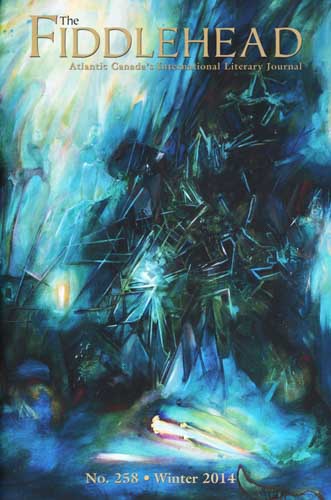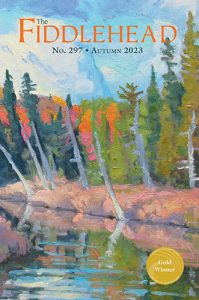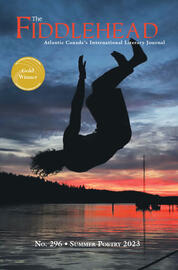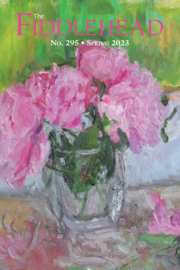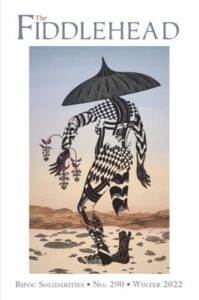The Fiddlehead – Winter 2014
The Winter 2014 issue of Fiddlehead turns on moments of awareness of awareness, capturing the instants we catch ourselves catching ourselves, revelations of self to self, to the reader, and to other characters. It’s charming, this subtle focus moving from piece to piece, from poem to prose to poem to poem, and the sequence suggests this international journal from the University of New Brunswick is edited with precision.
The Winter 2014 issue of Fiddlehead turns on moments of awareness of awareness, capturing the instants we catch ourselves catching ourselves, revelations of self to self, to the reader, and to other characters. It’s charming, this subtle focus moving from piece to piece, from poem to prose to poem to poem, and the sequence suggests this international journal from the University of New Brunswick is edited with precision.
The musical flow between these thirty-three poems (by sixteen poets) and four short stories makes its own composition of energy, crescendo, expansion, and contraction, but the pieces also move naturally through transitions in subject and focus. For example, we start with Lee Peterson’s “Things That Go,” in which we study “catastrophes in miniature” and have this fairy tale reference in the line “She sleeps. The snow a white silence,” which leads deftly into Shane Neilson’s three Alice in Wonderland prose poems where we first find a “Bigsmall Alice” to follow through a series of situations depicted in woodcut artist George Walker’s “Alice’s Misadventures.” Neilson writes, “Praise the non-linear, it is the royal road; she is the devil in a blue dress, blue dress,” Then, Gary Allen’s “In the house of his grandparent’s” opens with a house that “is either too small / or the table is of gigantic proportion,” and though the narrative has moved from the imagined to the realistically remembered, the setting is eerily similar, even if the tone has quieted in the created silence. And while each of these authors merit his or her own discussions and reflections, the arc of the sequence is suggestive to me of the editors’ prowess in putting together this issue.
The most significantly unifying thread I notice running through most of the writing is, however, the attention made to the clarifying moment of awareness when the speaker, writer, or character seems to turn his or her attention inward to the self’s awareness of the magic, pureness, potency, or potential in the represented situation, as evidenced in Bruce Bond’s “Earth.” He writes “you think, it’s here, I am / having one of those Oh-my-God- / I’m-alive moments . . .” Adam Sol’s speaker in “That Year’s Fall” expresses it this way: “but a part of your mind . . . / is thinking not what’s happening but oh / so this is how it happens.”
In her powerful, segmented short story “The Things We Lose on Purpose,” Michelle Barker’s narrator Hanna acknowledges, “I stood in the yard for a minute because as a human being I was supposed to appreciate the moment.” This awareness of self through situation and the expectations of feeling compared to the actual reactions was the human chord I felt struck again and again through this story—and the issue collectively.
The clarity of this consciousness is akin to a kind of waking up, like that so eloquently expressed in Alberto Ríos’s “On Waking, If Waking,” where a father waking up his son becomes “the timekeeper my father was,” where the speaker becomes the alarm clock “saying get up, son, for us all.” The awareness is also prominent in Ríos’s “Me the Man in a Hurry,” in which the poem’s speaker relays the logic of not rushing past a slow walker ahead of him on the sidewalk by expressing the additional delays that would result from the physical interaction.
And this is an issue that shouldn’t be rushed through. Even the five reviews that culminate this issue of Fiddlehead speak of the humanness in recognizing these moments, turning inward, tuning toward the vox humana. I highly recommend you do the same.
[www.thefiddlehead.ca]

